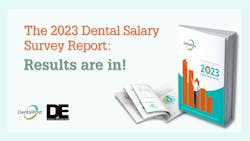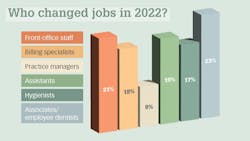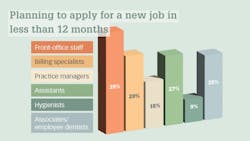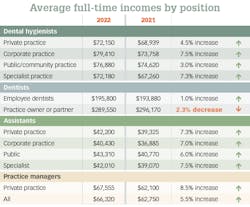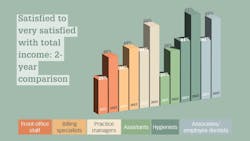The 2023 Dental Salary Report: Results are in!
DentalPost’s annual salary survey report paints a picture of overall higher salaries, better benefits, and increased satisfaction among dental professionals. But there are still challenges dental practices must overcome to retain and attract top talent.
For the fourth consecutive year, in partnership with Dental Economics and RDH magazine, DentalPost conducted its nationwide survey of nearly 15,000 dental professionals, including dentists, dental hygienists, dental assistants, dental practice managers, dental billing specialists, and front office staff. The most extensive dental industry survey of its kind, the comprehensive report covers everything from compensation and benefits to bonuses and work conditions.
Prefer a visual take on this data? View the gallery on DentistryIQ.com.
A dental workforce on the move
Hygienists and assistants made up 36% of the combined dental workforce who migrated to new practices in 2022. Unsurprisingly, higher pay, better benefits, and a positive work culture were their top reasons.
Among employee/associate dentists, 23% changed jobs last year, indicating turnover for this position may be trending in the same direction as hygienists and assistants. Their top reasons were different, with a better work environment ranking highest, followed by a better location and new type of position.
Dental assistants, billing specialists, and front office team members are the most likely to apply for a new job in the coming year. It’s anticipated that the turnover for dental assistants could be as high as 30% in 2023.
This latest survey also reveals that retirement rates will outpace the output of new dental professionals graduating from dental programs in the coming years. Recruiting will remain competitive for open positions, challenging employers to retain dissatisfied employees and continue working with finite staff.
As incomes increased, so did overall job and pay satisfaction
Increases in average salaries can be credited for growing job satisfaction across all positions. Since income was the highest-rated motivator for dental professionals who changed jobs last year, the rise in income provides a barometer for employers to attract and retain employees in 2023.
Benefits also improved
Across private and corporate practices, medical, dental, and retirement benefits increased, likely contributing to the overall increases we saw in satisfaction. Notably, the percentage of all hygienists receiving medical benefits rose from 15% to 46%. In private practices, 35.5% now receive medical benefits compared to 77% in corporate practices (DSOs). Paid family leave remains the least provided benefit.
Practice owners cut their own pay to cover rising costs
As compensation improved for team members, many self-employed dentists reported cutting their own salaries to provide raises for employees and cover inflating overhead costs.
Staff incomes rose, but by how much?
Despite receiving higher-than-normal pay raises, average income increases still did not keep up with the nation’s 8.2% inflation rate for the 12 months ending in September 2022.
Office managers’ pay increased an average of 5.5% across private and corporate practices. Looking at private practices alone, average pay increases jumped to 8.5%.
The average hourly rate of billing specialists increased by 13%, from $21.60 to $24.50. Front office staff members (who are not practice managers or billing specialists) saw a 6.5% increase in average hourly rates, from $21.60 to $23.00.
Overall income satisfaction is up, but we still have work to do
Despite incomes increasing for the second consecutive year, dental assistants, billing specialists, and front office team members were the least satisfied with their pay and more inclined to pursue new job opportunities. Several dental assistants indicated they are considering leaving the dental profession altogether in search of alternative careers.
The growing determination to find the right position with the right practice resulted in more employees taking the initiative to improve their pay and work circumstances. For example, 40% of responding dental hygienists and 44% of responding dental assistants asked their employer for a raise last year.
And it worked. According to survey respondents, 66% of hygienists and 43% of assistants who asked for a bump in pay received it. As for those who didn’t get the raises they asked for, the survey showed increased dissatisfaction resulting from the inaction. In fact, 14% of hygienists and 18% of dental assistants who did not receive raises changed employers.
At the time of the survey, 19% of the dissatisfied hygienists and a whopping 42% of the dissatisfied dental assistants were applying for new positions. This is a trend employers will want to watch closely in the coming year.
So, what can we do to attract top talent in a competitive market?
While we expect staffing issues to persist in the year ahead, there are ways to get ahead of the challenges. We already know that higher income and a more positive work environment are the two leading motivators for most dental professionals who seek to change employment. In the case of employee dentists, a more positive work environment and better location outweigh higher income. The next biggest motivator overwhelmingly cited across all positions is the need to feel appreciated by employers.
The survey affirms that the top three ways to retain top talent and compete for new team members are to:
- Offer competitive compensation
- Provide a positive work environment
- Demonstrate gratitude
A “standout” practice will also foster a community of continuous learning and support as the youngest dental professionals seek mentorship and growth opportunities. These are among their top priorities, whether they are dentists, dental hygienists, dental assistants, or front office team members.
Yes, salary is important. But money alone won’t keep top talent on your team or make you attractive to new hires as you grow your practice. A well-rounded mix of pay, culture, and kudos goes a long way.
More articles about staffing
Practice production, prioritized: The dental staffing crisis
Competitive compensation in dentistry: What is it and how do you offer it?
Managing the impact of higher dental staffing expenses
Tonya Lanthier, RDH, is founder and president of DentalPost. A registered dental hygienist-turned-entrepreneur, Tonya has earned industry-wide acclaim for helping dental practices build teams that excel through metric-based career-matching tools to help them find the right fit.
About the Author

Tonya Lanthier, RDH
TONYA LANTHIER, RDH, is the founder and CEO of DentalPost, the dental industry’s premier and largest online and mobile job board. A registered dental hygienist turned entrepreneur, Tonya has gained acclaim industrywide for her passion to improve lives and help dental professionals build teams that excel through metric-based career matching tools, including personality tests and values, skills, and work culture assessments.
